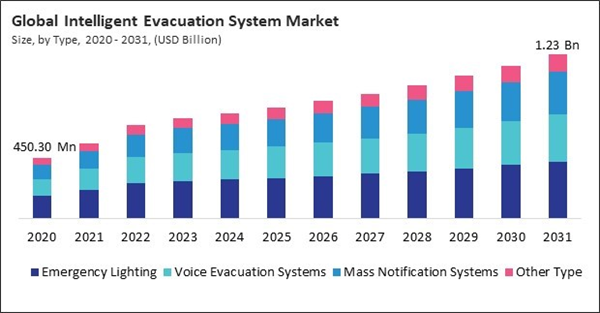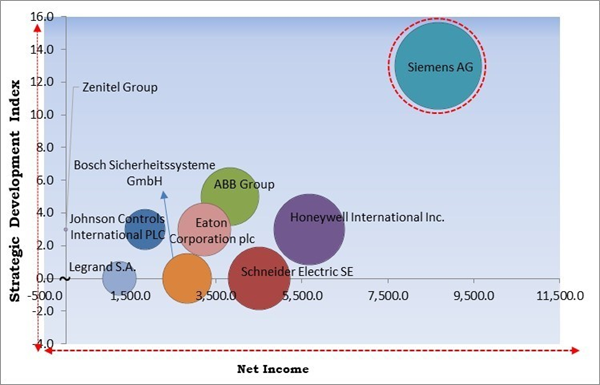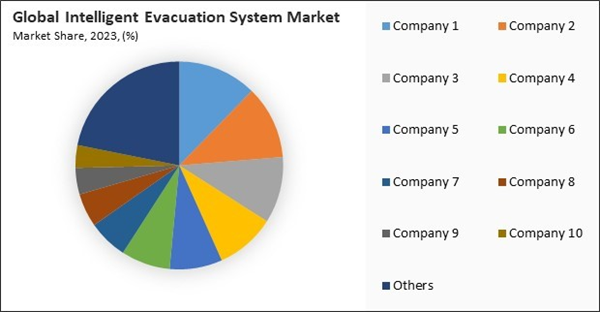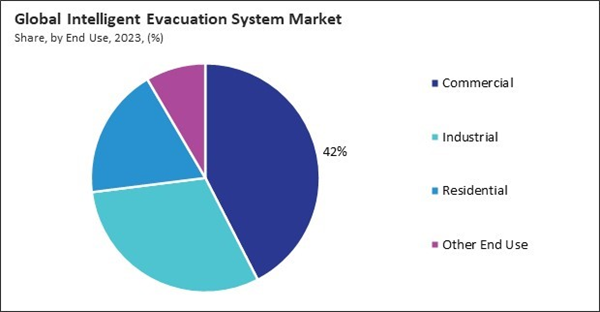The North America region is driven by a high level of awareness regarding emergency preparedness and stringent safety regulations. The region’s advanced infrastructure, coupled with the widespread adoption of IoT and AI technologies, has facilitated the deployment of intelligent evacuation systems across commercial, industrial, and residential spaces. Furthermore, frequent natural disasters, such as hurricanes and wildfires, have underscored the importance of robust evacuation systems. Substantial investments in smart buildings and retrofitting older infrastructure with modern safety solutions have further boosted market growth in this region. Thus, the North America segment witnessed 35% revenue share in the market in 2023.
The major strategies followed by the market participants are Product Launch as the key developmental strategy to keep pace with the changing demands of end users. For instance, In October, 2024, Zenitel Group introduces its Unified Critical Communication platform, which showcases a seamless integration of intercoms, IP speakers, public address, and voice alarm systems. Partnering with SAC Nordic and COBS, Zenitel aims to enhance communication reliability and security for Swedish organizations during critical events.
KBV Cardinal Matrix - Market Competition Analysis
Based on the Analysis presented in the KBV Cardinal matrix; Siemens AG is the forerunner in the Intelligent Evacuation System Market. Companies such as Honeywell International Inc., Schneider Electric SE, and ABB Group are some of the key innovators in Intelligent Evacuation System Market. In November, 2024, Siemens AG Smart Infrastructure introduces the SIMATIC ET 200SP e-Starter, a fully electronic motor starter with semiconductor technology. It offers ultra-fast short-circuit protection, is wear-free, and integrates into the TIA concept. Compact and space-efficient, it's ideal for demanding applications in industries like food and beverage, logistics, and mechanical engineering.Market Growth Factors
The emphasis on public safety has become a top priority across various sectors, driving the demand for intelligent evacuation systems. In commercial buildings, industrial facilities, and densely populated public spaces, ensuring the safety of occupants during emergencies is critical. These systems are specifically engineered to address the intricacies of evacuation in high-risk and expansive environments, providing prompt and effective responses to potential hazards.Additionally, the integration of advanced technologies such as the Internet of Things (IoT), Artificial Intelligence (AI), sensors, and automated control mechanisms results in substantial upfront expenses for the deployment of intelligent evacuation systems. These systems are intended to enhance safety, facilitate efficient evacuation planning, and provide real-time monitoring. Hence, these high initial costs remain a significant obstacle, slowing the adoption rate of intelligent evacuation systems.
Market Restraining Factors
The integration of advanced technologies such as the Internet of Things (IoT), Artificial Intelligence (AI), sensors, and automated control mechanisms results in substantial upfront expenses for the deployment of intelligent evacuation systems. These systems are intended to enhance safety, facilitate efficient evacuation planning, and provide real-time monitoring. However, incorporating cutting-edge technology increases the overall cost of the equipment and installation. Hence, these high initial costs remain a significant obstacle, slowing the adoption rate of intelligent evacuation systems.The leading players in the market are competing with diverse innovative offerings to remain competitive in the market. The above illustration shows the percentage of revenue shared by some of the leading companies in the market. The leading players of the market are adopting various strategies in order to cater demand coming from the different industries. The key developmental strategies in the market are Product Launches and Product Expansions.
Driving and Restraining Factors
Drivers
- Increased Focus on Public Safety
- Integration of Advanced Technologies
- Increased Urbanization and Infrastructure Development
Restraints
- High Initial Costs of Evacuation Systems
- Complex Installation and Maintenance
Opportunities
- Growing Focus on Critical Infrastructure Protection
- Rising Adoption in the Transportation Sector
Challenges
- Limited Infrastructure in Emerging Economies
- Increasing Exposure to Cybersecurity Vulnerabilities
End Use Outlook
On the basis of end use, the market is divided into commercial, industrial, residential, and others. The commercial segment acquired 42% revenue share in the market in 2023. Stringent safety regulations and fire and emergency preparedness mandates in public spaces such as office complexes, malls, airports, and educational institutions drive the commercial segment.Type Outlook
By industry vertical, the market is divided into IT & telecom, BFSI, healthcare, government & defense, media & entertainment, retail, and others. The BFSI segment procured 16% revenue share in the market in 2023. The BFSI sector is thriving due to the growing demand for secure, reliable, and scalable data center solutions to manage sensitive customer data and critical financial operations. These data centers provide a perfect fit by offering advanced security features, efficient disaster recovery options, and the flexibility to scale with rising data demands.Market Competition and Attributes
The Intelligent Evacuation System market is highly competitive, driven by advancements in smart technologies and increasing safety regulations. Key attributes include real-time monitoring, AI-powered decision-making, and integration with IoT devices for enhanced efficiency. Systems emphasize features like automated alerts, adaptive evacuation routes, and robust communication networks to ensure safety during emergencies. The market is characterized by innovation, with players focusing on scalability, cost-effectiveness, and ease of installation to meet growing demand across sectors such as commercial, industrial, and public infrastructure.
By Regional Analysis
Region-wise, the market is analyzed across North America, Europe, Asia Pacific, and LAMEA. The Europe segment garnered 32% revenue share in the market in 2023. The Europe segment benefits from stringent government regulations mandating fire safety and emergency preparedness in public and private infrastructure.Recent Strategies Deployed in the Market
- Nov-2024: Siemens AG Smart Infrastructure introduces the SIMATIC ET 200SP e-Starter, a fully electronic motor starter with semiconductor technology. It offers ultra-fast short-circuit protection, is wear-free, and integrates into the TIA concept. Compact and space-efficient, it's ideal for demanding applications in industries like food and beverage, logistics, and mechanical engineering.
- Oct-2024: Siemens AG Smart Infrastructure announced the acquisition of Danfoss Fire Safety, a leader in fire suppression technology, to enhance its sustainable fire safety portfolio. The acquisition will strengthen Siemens' position in fast-growing markets like data centers and industrial spaces. Danfoss Fire Safety will remain a separate entity, reporting to Siemens' Buildings Business Unit.
- Oct-2024: Zenitel Group introduces its Unified Critical Communication platform, which showcases a seamless integration of intercoms, IP speakers, public address, and voice alarm systems. Partnering with SAC Nordic and COBS, Zenitel aims to enhance communication reliability and security for Swedish organizations during critical events.
- Jun-2024: ABB Group teamed up with Witt India to advance tunnel ventilation technology, with smoke extraction motors powering Witt's Banana Jet Fans. This collaboration enhances tunnel safety, airflow, smoke control, and energy efficiency in critical projects like the Rewa-Sidhi and Kuthiran tunnels, ensuring safer, more efficient travel across India's infrastructure.
- Aug-2023: Johnson Controls International PLC unveiled the Simplex Foundation Series fire detection systems, designed for small to mid-size buildings. This comprehensive, off-the-shelf solution includes both addressable and non-addressable models, along with a complete range of reliable, proven Simplex devices, ensuring robust protection for building safety.
- Jan-2023: Siemens AG has launched two new aspirating smoke detectors (FDA261 and FDA262) with coverage up to 6,700 m², the largest on the market. Featuring fast digital commissioning via the ASD Connect app, these detectors offer enhanced detection, reduced false alarms, and easy integration into Siemens fire safety systems, ensuring sustainability and flexibility.
- Oct-2022: Eaton Corporation plc unveiled the Adaptive Evacuation System, which enhances life safety by enabling faster, safer evacuations. Integrated with CCTV, fire detection, and other devices, it selects the safest exit route. Operators can modify recommendations in real time. The system is extensively tested and meets current regulatory standards, though full standardization is still pending.
List of Key Companies Profiled
- Honeywell International Inc. (Honeywell HBT)
- Siemens AG
- Johnson Controls International PLC
- Schneider Electric SE
- Legrand S.A. (Legrand Group)
- Bosch Sicherheitssysteme GmbH (Robert Bosch GmbH)
- Zenitel Group
- Eaton Corporation plc
- ABB Group
- Mircom Group of Companies
Market Report Segmentation
By Type
- Emergency Lighting
- Voice Evacuation Systems
- Mass Notification Systems
- Other Type
By End Use
- Commercial
- Industrial
- Residential
- Other End Use
By Geography
- North America
- US
- Canada
- Mexico
- Rest of North America
- Europe
- Germany
- UK
- France
- Russia
- Spain
- Italy
- Rest of Europe
- Asia Pacific
- China
- Japan
- India
- South Korea
- Australia
- Malaysia
- Rest of Asia Pacific
- LAMEA
- Brazil
- Argentina
- UAE
- Saudi Arabia
- South Africa
- Nigeria
- Rest of LAMEA
Table of Contents
Companies Mentioned
- Honeywell International Inc. (Honeywell HBT)
- Siemens AG
- Johnson Controls International PLC
- Schneider Electric SE
- Legrand S.A. (Legrand Group)
- Bosch Sicherheitssysteme GmbH (Robert Bosch GmbH)
- Zenitel Group
- Eaton Corporation plc
- ABB Group
- Mircom Group of Companies













